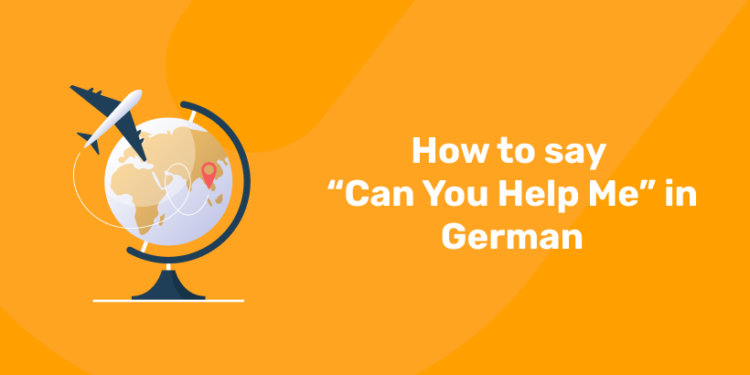Table of Contents
Knowing how to say “Can you help me?” in German is very useful. It’s a basic phrase that can help you in many situations. Learning it makes it easier to ask for help in Germany or with German speakers. Let’s look at how to say this phrase in a simple way.
This phrase is a great starting point when you’re in need of help. Whether you’re lost, need directions, or have a question, knowing how to ask for help in German will make your experience easier. It also shows you’re trying to speak the language, which people will appreciate.
Now, let’s break down how to say “Can you help me?” and practice using it in real conversations.
Click here to join the Entri online German language course! Watch demo classes here!
How to Say “Can You Help Me?” in German
When you’re in a German-speaking country or with German speakers, knowing how to ask for help is very important. Here are different ways to say “Can you help me?” in German, along with examples and explanations.
1. Basic and Polite Form:
- Kannst du mir helfen?
(Informal: Can you help me?)
This is the most common way to ask for help in informal situations, like with friends or people your age.
- Example:
“Kannst du mir helfen, den Weg zu finden?”
(Can you help me find the way?) - Translation:
“Kannst du” means “Can you” and “mir helfen” means “help me.”
- Können Sie mir helfen?
(Formal: Can you help me?)
Use this in formal situations, such as with strangers, older people, or in a professional setting.
- Example:
“Können Sie mir helfen, diesen Brief zu übersetzen?”
(Can you help me translate this letter?) - Translation:
“Können Sie” is the polite form of “Can you,” and “mir helfen” means “help me.”
2. Asking for a Favor:
- Könntest du mir bitte helfen?
(Informal: Could you please help me?)
This version is more polite and softer, often used to show respect.
- Example:
“Könntest du mir bitte beim Tragen helfen?”
(Could you please help me carry this?) - Translation:
“Könntest du” is the conditional form of “Can you,” adding politeness with “bitte” (please).
- Könnten Sie mir bitte helfen?
(Formal: Could you please help me?)
Use this to politely ask for help from someone you don’t know well.
- Example:
“Könnten Sie mir bitte die Tür öffnen?”
(Could you please open the door for me?) - Translation:
“Könnten Sie” makes the request more formal, with “bitte” for politeness.
3. Casual Request for Help:
- Hilfst du mir?
(Informal: Will you help me?)
This is a casual way to ask for help, used with friends or family.
- Example:
“Hilfst du mir mit den Hausaufgaben?”
(Will you help me with the homework?) - Translation:
“Hilfst du” means “Will you help,” and “mir” is “me.”
4. Offering Help:
- Brauchen Sie Hilfe?
(Do you need help?)
This is used when offering assistance to someone.
- Example:
“Brauchen Sie Hilfe beim Tragen der Taschen?”
(Do you need help carrying the bags?) - Translation:
“Brauchen Sie” means “Do you need,” and “Hilfe” means “help.”
5. Urgent Help:
- Könnt ihr mir helfen?
(Can you all help me?)
This is used when asking a group of people for help in an urgent situation.
- Example:
“Könnt ihr mir helfen, den Krankenwagen zu rufen?”
(Can you all help me call the ambulance?) - Translation:
“Könnt ihr” means “Can you all,” addressing multiple people.
Summary of Key Phrases:
- Kannst du mir helfen? (Can you help me? – Informal)
- Können Sie mir helfen? (Can you help me? – Formal)
- Könntest du mir bitte helfen? (Could you please help me? – Informal, polite)
- Könnten Sie mir bitte helfen? (Could you please help me? – Formal, polite)
- Hilfst du mir? (Will you help me? – Informal)
- Brauchen Sie Hilfe? (Do you need help?)
- Könnt ihr mir helfen? (Can you all help me? – Addressing a group)
Formal Alternatives to “Can You Help Me?” in German
When you need to ask for help in a formal setting or when addressing someone respectfully, here are some polite alternatives:
1. Könnten Sie mir bitte helfen?
(Could you please help me?)
This is a polite and formal way to request assistance.
- Example:
“Könnten Sie mir bitte den Bericht schicken?”
(Could you please send me the report?)
2. Wären Sie so freundlich, mir zu helfen?
(Would you be so kind as to help me?)
This phrase is very courteous and suitable for formal requests.
- Example:
“Wären Sie so freundlich, mir bei diesem Problem zu helfen?”
(Would you be so kind as to help me with this problem?)
3. Dürfte ich um Ihre Hilfe bitten?
(May I ask for your help?)
This is a formal and respectful way to ask for assistance.
- Example:
“Dürfte ich um Ihre Hilfe bei der Übersetzung bitten?”
(May I ask for your help with the translation?)
4. Könnten Sie mir vielleicht behilflich sein?
(Could you perhaps be of assistance to me?)
This is a polite and slightly more indirect way of requesting help.
- Example:
“Könnten Sie mir vielleicht behilflich sein, den Kontakt herzustellen?”
(Could you perhaps be of assistance in establishing the contact?)
5. Ich würde mich freuen, wenn Sie mir helfen könnten.
(I would be pleased if you could help me.)
This phrase shows appreciation and formality.
- Example:
“Ich würde mich freuen, wenn Sie mir bei der Planung der Veranstaltung helfen könnten.”
(I would be pleased if you could help me with planning the event.)
Summary of Formal Alternatives:
- Könnten Sie mir bitte helfen? (Could you please help me?)
- Wären Sie so freundlich, mir zu helfen? (Would you be so kind as to help me?)
- Dürfte ich um Ihre Hilfe bitten? (May I ask for your help?)
- Könnten Sie mir vielleicht behilflich sein? (Could you perhaps be of assistance to me?)
- Ich würde mich freuen, wenn Sie mir helfen könnten. (I would be pleased if you could help me.)
These alternatives are suitable for formal conversations and professional settings where respect and politeness are essential.
How to Respond to “Can You Help Me?” in German
When someone asks for help in German, your response will depend on whether you can assist them or not. Here are various ways to respond:
1. Affirmative Responses:
- Ja, natürlich.
(Yes, of course.)This is a simple and straightforward way to agree to help.- Example:
“Ja, natürlich. Was brauchst du?”
(Yes, of course. What do you need?)
- Example:
- Selbstverständlich.
(Certainly.)This response indicates that you are happy to help.- Example:
“Selbstverständlich, ich helfe dir gerne.”
(Certainly, I’m happy to help you.)
- Example:
- Ich helfe dir gerne.
(I’m happy to help you.)This phrase shows willingness and friendliness.- Example:
“Ich helfe dir gerne bei deinen Aufgaben.”
(I’m happy to help you with your tasks.)
- Example:
- Wie kann ich dir helfen?
(How can I help you?)This is a more detailed response that asks for specifics about the assistance needed.- Example:
“Wie kann ich dir helfen, deine Präsentation vorzubereiten?”
(How can I help you prepare your presentation?)
- Example:
2. Neutral Responses:
- Ich werde sehen, was ich tun kann.
(I’ll see what I can do.)This is a polite way to indicate that you will try to help, though it’s not a guarantee.- Example:
“Ich werde sehen, was ich tun kann, um dir zu helfen.”
(I’ll see what I can do to help you.)
- Example:
- Ich kann es versuchen.
(I can try.)This suggests that you are willing to help, but may not be sure if you can.- Example:
“Ich kann es versuchen. Was genau brauchst du?”
(I can try. What exactly do you need?)
- Example:
3. Negative Responses:
- Es tut mir leid, aber ich kann nicht helfen.
(I’m sorry, but I can’t help.)This is a polite way to decline the request for help.- Example:
“Es tut mir leid, aber ich kann nicht helfen, weil ich beschäftigt bin.”
(I’m sorry, but I can’t help because I’m busy.)
- Example:
- Leider bin ich nicht in der Lage, zu helfen.
(Unfortunately, I’m not able to help.)This is a formal way to say that you can’t assist.- Example:
“Leider bin ich nicht in der Lage, zu helfen, da ich keine Erfahrung in diesem Bereich habe.”
(Unfortunately, I’m not able to help as I have no experience in this area.)
- Example:
- Ich bin mir nicht sicher, ob ich helfen kann.
(I’m not sure if I can help.)This response indicates uncertainty about being able to assist.- Example:
“Ich bin mir nicht sicher, ob ich helfen kann. Vielleicht kann jemand anderes das übernehmen.”
(I’m not sure if I can help. Maybe someone else can take care of it.)
- Example:
Summary of Responses:
- Ja, natürlich. (Yes, of course.)
- Selbstverständlich. (Certainly.)
- Ich helfe dir gerne. (I’m happy to help you.)
- Wie kann ich dir helfen? (How can I help you?)
- Ich werde sehen, was ich tun kann. (I’ll see what I can do.)
- Ich kann es versuchen. (I can try.)
- Es tut mir leid, aber ich kann nicht helfen. (I’m sorry, but I can’t help.)
- Leider bin ich nicht in der Lage, zu helfen. (Unfortunately, I’m not able to help.)
- Ich bin mir nicht sicher, ob ich helfen kann. (I’m not sure if I can help.)
Use these responses to effectively communicate whether you can assist someone or not in German.
Tips for Practicing German Greetings: “Can You Help Me”
1: How do you say "Good Morning" in German?
Practicing how to ask for help in German can be both practical and beneficial. Here are some tips to help you get comfortable with this important phrase:
1. Learn Key Phrases
- Start with Basic Phrases:
- “Kannst du mir helfen?” (Can you help me? – Informal)
- “Können Sie mir helfen?” (Can you help me? – Formal)
- Practice these phrases regularly to become familiar with their pronunciation and usage.
2. Use Flashcards
- Create flashcards with different ways to ask for help and their meanings.
- Review them regularly to reinforce your memory and improve recall.
3. Practice with a Partner
- Engage in role-playing exercises with a friend or language partner.
- Take turns asking and offering help to simulate real-life conversations.
4. Listen and Repeat
- Listen to native speakers using these phrases in videos, podcasts, or language apps.
- Repeat after them to practice pronunciation and intonation.
5. Incorporate into Daily Routine
- Use these phrases in daily scenarios where you might need help, even if you’re just practicing alone.
- For example, ask for help with a task or a question in German, even if it’s just a mental exercise.
6. Practice in Context
- Imagine real-life situations where you might need to ask for help, such as asking for directions or assistance with a task.
- Write short dialogues using the phrases to practice how they fit into different contexts.
7. Record Yourself
- Record your pronunciation of these phrases and listen to the recordings.
- Compare them to native speakers and adjust your pronunciation as needed.
8. Seek Feedback
- Ask a teacher or language exchange partner for feedback on your use of these phrases.
- Incorporate their suggestions to improve your accuracy and fluency.
9. Join a Language Group or Class
- Participate in a German language class or conversation group where you can practice asking for help in a structured setting.
- Engage in group activities or role-plays that involve asking for and offering assistance, providing valuable practice and feedback.
10. Use Language Learning Apps
- Utilize language learning apps like Entri.App that focus on practical phrases and real-life scenarios.
- Practice asking for help using interactive exercises, quizzes, and conversation simulations to reinforce your skills in various contexts.
Exercises for Practicing German Greetings: “Can You Help Me”
Exercise 1: Fill in the Blanks
Complete the sentences with the appropriate form of “Can you help me?” in German.
- _________ (you, informal) den Weg finden?
- _________ (you, formal) mir bitte bei der Übersetzung helfen?
- _________ (you all) mir beim Tragen der Kisten helfen?
- _________ (you, informal) bei diesem Problem?
- _________ (you, formal) mir bitte die Rechnung zeigen?
- _________ (you, informal) mit der Hausaufgabe?
Answers:
- Kannst du mir helfen, den Weg zu finden?
(Can you help me find the way?) - Können Sie mir bitte bei der Übersetzung helfen?
(Can you please help me with the translation?) - Könnt ihr mir beim Tragen der Kisten helfen?
(Can you all help me carry the boxes?) - Hilfst du mir bei diesem Problem?
(Will you help me with this problem?) - Könnten Sie mir bitte die Rechnung zeigen?
(Could you please show me the bill?) - Kannst du mir mit der Hausaufgabe helfen?
(Can you help me with the homework?)
Exercise 2: Translate the Phrases
Translate the following phrases from German to English.
- “Könnten Sie mir bitte behilflich sein?”
- “Ich würde mich freuen, wenn Sie mir helfen könnten.”
- “Wären Sie so freundlich, mir den Weg zu zeigen?”
- “Dürfte ich um Ihre Hilfe bitten?”
- “Könnten Sie mir bitte die Datei senden?”
- “Könnten Sie mir bei der Suche nach einem Hotel helfen?”
Answers:
- “Could you please be of assistance to me?”
- “I would be pleased if you could help me.”
- “Would you be so kind as to show me the way?”
- “May I ask for your help?”
- “Could you please send me the file?”
- “Could you help me find a hotel?”
Exercise 3: Match the Situation with the Response
Match each situation with the most appropriate response in German.
- You are offering help to someone in finding a restaurant.
- a) “Können Sie mir bitte helfen?”
- b) “Wie kann ich dir helfen?”
- c) “Ich kann es versuchen.”
- You’re offering help to someone who looks lost.
- a) “Hilfst du mir?”
- b) “Wie kann ich Ihnen behilflich sein?”
- c) “Es tut mir leid, aber ich kann nicht helfen.”
- You are uncertain if you can help with a complex task.
- a) “Selbstverständlich.”
- b) “Es tut mir leid, aber ich kann nicht helfen.”
- c) “Ich werde sehen, was ich tun kann.”
- You are helping someone with their luggage.
- a) “Wie kann ich dir helfen?”
- b) “Kannst du mir bitte helfen?”
- c) “Selbstverständlich, ich helfe dir gerne.”
- You need assistance with understanding a German legal document.
- a) “Dürfte ich um Ihre Hilfe bitten?”
- b) “Es tut mir leid, aber ich kann nicht helfen.”
- c) “Wie kann ich Ihnen behilflich sein?”
Answers:
- b) “Wie kann ich dir helfen?”
(How can I help you?) - b) “Wie kann ich Ihnen behilflich sein?”
(How can I be of assistance to you?) - c) “Ich werde sehen, was ich tun kann.”
(I’ll see what I can do.) - c) “Selbstverständlich, ich helfe dir gerne.”
(Certainly, I’m happy to help.) - a) “Dürfte ich um Ihre Hilfe bitten?”
(May I ask for your help?)
Exercise 4: Role Play
Imagine the following scenarios and write a brief dialogue in German.
- You need help with a heavy suitcase at the airport.
- Your line: “Könnten Sie mir bitte beim Tragen des Koffers helfen?”
(Could you please help me with carrying the suitcase?) - Response: “Ja, natürlich. Lassen Sie mich helfen.”
(Yes, of course. Let me help.)
- Your line: “Könnten Sie mir bitte beim Tragen des Koffers helfen?”
- You need help understanding a German menu in a restaurant.
- Your line: “Dürfte ich um Ihre Hilfe bitten, das Menü zu verstehen?”
(May I ask for your help understanding the menu?) - Response: “Selbstverständlich, ich helfe Ihnen gerne.”
(Certainly, I’m happy to help you.)
- Your line: “Dürfte ich um Ihre Hilfe bitten, das Menü zu verstehen?”
- You need assistance with setting up a meeting.
- Your line: “Könnten Sie mir bitte beim Einrichten des Meetings helfen?”
(Could you please help me set up the meeting?) - Response: “Ja, ich helfe Ihnen dabei. Wann soll das Meeting stattfinden?”
(Yes, I’ll help you with that. When should the meeting take place?)
- Your line: “Könnten Sie mir bitte beim Einrichten des Meetings helfen?”
- You need help with a technical issue on your computer.
- Your line: “Könnten Sie mir bei einem technischen Problem mit meinem Computer helfen?”
(Could you help me with a technical issue on my computer?) - Response: “Natürlich, ich sehe mir das gerne an.”
(Of course, I’d be happy to take a look.)
- Your line: “Könnten Sie mir bei einem technischen Problem mit meinem Computer helfen?”
Exercise 5: Multiple Choice Questions
Choose the correct response for each situation.
- You need help fixing a broken lamp.
- a) “Kannst du mir bitte das Zimmer zeigen?”
- b) “Könnten Sie mir bitte bei der Reparatur der Lampe helfen?”
- c) “Wären Sie so freundlich, mir das Menü zu bringen?”
- You need assistance with filling out a form.
- a) “Dürfte ich um Ihre Hilfe beim Ausfüllen dieses Formulars bitten?”
- b) “Kannst du mir bitte den Weg zum Restaurant zeigen?”
- c) “Könnten Sie mir bitte den Termin bestätigen?”
- You need help understanding a complex instruction.
- a) “Könnten Sie mir bitte bei diesem technischen Problem helfen?”
- b) “Könnten Sie mir bitte das Buch bringen?”
- c) “Wie kann ich Ihnen behilflich sein?”
- You’re asking someone to help you find a nearby hospital.
- a) “Könnten Sie mir bitte beim Einrichten des Termins helfen?”
- b) “Könnten Sie mir bitte das Hotel empfehlen?”
- c) “Könnten Sie mir bitte den Weg zum nächsten Krankenhaus zeigen?”
- You need help understanding a German film.
- a) “Dürfte ich um Ihre Hilfe bei diesem Film bitten?”
- b) “Könnten Sie mir bitte bei der Suche nach einem Hotel helfen?”
- c) “Könnten Sie mir bitte bei der Analyse des Films helfen?”
- You need assistance with buying a train ticket.
- a) “Könnten Sie mir bitte beim Kauf eines Zugtickets helfen?”
- b) “Könnten Sie mir bitte den Weg zum Bahnhof zeigen?”
- c) “Wie kann ich Ihnen behilflich sein?”
Answers:
- b) “Könnten Sie mir bitte bei der Reparatur der Lampe helfen?”
(Could you please help me with the repair of the lamp?) - a) “Dürfte ich um Ihre Hilfe beim Ausfüllen dieses Formulars bitten?”
(May I ask for your help in filling out this form?) - a) “Könnten Sie mir bitte bei diesem technischen Problem helfen?”
(Could you please help me with this technical problem?) - c) “Könnten Sie mir bitte den Weg zum nächsten Krankenhaus zeigen?”
(Could you please show me the way to the nearest hospital?) - c) “Könnten Sie mir bitte bei der Analyse des Films helfen?”
(Could you please help me with analyzing the film?) - a) “Könnten Sie mir bitte beim Kauf eines Zugtickets helfen?”
(Could you please help me with buying a train ticket?)
Exercise 6: Conversation Simulation
Simulate a conversation where you ask for help in various situations. Write both parts of the dialogue.
- Situation: Asking for help with understanding a technical manual.
- You: “Könnten Sie mir bitte beim Verständnis dieses technischen Handbuchs helfen?”
(Could you please help me understand this technical manual?) - Helper: “Ja, natürlich. Welche Abschnitte bereiten Ihnen Schwierigkeiten?”
(Yes, of course. Which sections are giving you trouble?)
- You: “Könnten Sie mir bitte beim Verständnis dieses technischen Handbuchs helfen?”
- Situation: Requesting help with a cooking recipe.
- You: “Dürfte ich um Ihre Hilfe bitten, dieses Rezept richtig zuzubereiten?”
(May I ask for your help in preparing this recipe correctly?) - Helper: “Selbstverständlich, ich erkläre Ihnen jeden Schritt des Rezepts.”
(Certainly, I’ll explain each step of the recipe to you.)
- You: “Dürfte ich um Ihre Hilfe bitten, dieses Rezept richtig zuzubereiten?”
- Situation: Seeking assistance with a language translation.
- You: “Könnten Sie mir bitte bei der Übersetzung dieses Textes helfen?”
(Could you please help me translate this text?) - Helper: “Ja, ich kann Ihnen helfen. Zeigen Sie mir den Text bitte.”
(Yes, I can help you. Please show me the text.)
- You: “Könnten Sie mir bitte bei der Übersetzung dieses Textes helfen?”
- Situation: Asking for help with organizing an event.
- You: “Könnten Sie mir bitte bei der Organisation der Veranstaltung helfen?”
(Could you please help me organize the event?) - Helper: “Ja, ich helfe gerne. Was müssen wir zuerst tun?”
(Yes, I’d be happy to help. What should we do first?)
- You: “Könnten Sie mir bitte bei der Organisation der Veranstaltung helfen?”
- Situation: Requesting help with fixing a leaking faucet.
- You: “Könnten Sie mir bitte bei der Reparatur dieses undichten Wasserhahns helfen?”
(Could you please help me repair this leaking faucet?) - Helper: “Natürlich, ich werde mir das ansehen und sehen, was ich tun kann.”
(Of course, I’ll take a look and see what I can do.)
- You: “Könnten Sie mir bitte bei der Reparatur dieses undichten Wasserhahns helfen?”
- Situation: Seeking assistance with understanding a complex invoice.
- You: “Dürfte ich um Ihre Hilfe bitten, diese komplexe Rechnung zu verstehen?”
(May I ask for your help in understanding this complex invoice?) - Helper: “Selbstverständlich, ich helfe Ihnen gerne dabei, sie zu klären.”
(Certainly, I’d be happy to help clarify it for you.)
- You: “Dürfte ich um Ihre Hilfe bitten, diese komplexe Rechnung zu verstehen?”
Click here to join the Entri online German language course! Watch demo classes here!
How to say “Can You Help Me” in German: Conclusion
Knowing how to ask for help in German is very useful. Use “Kannst du mir bitte helfen?” for informal situations and “Könnten Sie mir bitte helfen?” for formal ones. Practicing the phrases given in this blog will make it easier for you to communicate and get the help you need. Keep using and practicing these expressions to become more confident in German.
Frequently Asked Questions
How do I ask for help in an informal setting in German?
Use “Kannst du mir bitte helfen?” which means “Can you help me, please?”
What’s the formal way to ask for help in German?
You can say “Könnten Sie mir bitte helfen?” which translates to “Could you please help me?”
How do I ask for help politely in German?
You can use “Dürfte ich um Ihre Hilfe bitten?” which means “May I ask for your help?”
What’s a common way to offer help in German?
Say “Wie kann ich Ihnen behilflich sein?” which means “How can I assist you?”











